Out of belief comes life and all its attending stories. I have, over the last ten years deliberately chosen to keep some of these stories quieter or even private. Other than a few interviews and the occasional post here and there, I’ve required of myself what I’ve so often hoped for from others — a little reserve, maybe even silence. And so, on the topics of God, People, and Place — interdependent topics I’m very passionate about — I had gone mostly quiet.
All in Bookish
 We may ask ourselves, how are we Christ-imprinted? What is God calling us to do and be as we stand awed and fearful before some significantly burning bush? What needs to happen for us to receive some kind of stigmata — some signals that mark us as Christ’s own. Not, perhaps, the bloody wounds in the palms of the hands, but the pure, open, joyful, and contrite heart that God has promised to claim for Himself, to not despise, and to count as more valuable to Him than any human accomplishment and success.
We may ask ourselves, how are we Christ-imprinted? What is God calling us to do and be as we stand awed and fearful before some significantly burning bush? What needs to happen for us to receive some kind of stigmata — some signals that mark us as Christ’s own. Not, perhaps, the bloody wounds in the palms of the hands, but the pure, open, joyful, and contrite heart that God has promised to claim for Himself, to not despise, and to count as more valuable to Him than any human accomplishment and success.
 A hammock of flimsy web that should rip apart, but doesn’t. A hammock anchored to thin twigs that should break, but don’t. You climb in and hope it holds. I like to wonder about the nature of all this unseen support that offers not only the safety of the curl but the strength of the swing. I imagine the catch of angels; God’s infinite palm; the unknowable, immeasurable, yet nevertheless concrete woof and warp of divine will and presence.
A hammock of flimsy web that should rip apart, but doesn’t. A hammock anchored to thin twigs that should break, but don’t. You climb in and hope it holds. I like to wonder about the nature of all this unseen support that offers not only the safety of the curl but the strength of the swing. I imagine the catch of angels; God’s infinite palm; the unknowable, immeasurable, yet nevertheless concrete woof and warp of divine will and presence.
Then I look around.
 In my writing about my friend, I embellished certain details. I filled in the holes. And as a result, if I’m honest, I’m not sure which parts of the story are true, as in truly happened, and which parts I’ve added, piece by piece, over the years. Was it my need to remember that built this parallel between his eyes and the radio? Did we really smoke pot on a park bench, en plein air, as I’ve so often recalled, or was it cigarettes? Did he hold my hand during the movie we watched together, or did I dream that, too?
In my writing about my friend, I embellished certain details. I filled in the holes. And as a result, if I’m honest, I’m not sure which parts of the story are true, as in truly happened, and which parts I’ve added, piece by piece, over the years. Was it my need to remember that built this parallel between his eyes and the radio? Did we really smoke pot on a park bench, en plein air, as I’ve so often recalled, or was it cigarettes? Did he hold my hand during the movie we watched together, or did I dream that, too?
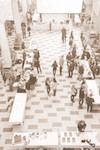 When I sat down last Friday night, I expected to hear an essay — fresh, different, perhaps unpublished — on one of his go-to topics, whether the environment, social justice concerns, or some other aspect of intentional living. Since the day I’d booked him, I’d been waiting for the moment when he’d take the stage and begin reading — his deeply rooted ethos already apparent, piercing — and then I would steal glances around the room to see the shock of recognition on the faces of my students, see the visible signs of narrative transport taking them to a new place with a master at the helm.
When I sat down last Friday night, I expected to hear an essay — fresh, different, perhaps unpublished — on one of his go-to topics, whether the environment, social justice concerns, or some other aspect of intentional living. Since the day I’d booked him, I’d been waiting for the moment when he’d take the stage and begin reading — his deeply rooted ethos already apparent, piercing — and then I would steal glances around the room to see the shock of recognition on the faces of my students, see the visible signs of narrative transport taking them to a new place with a master at the helm.
But something else happened. Not something bad, not less than . . . just different.
 Like any matter of taste, reading well is an exercise in preference, but as I consider the discovery of most of my favorite and abiding titles, I find that each one either came from following a strong writer, mimicking a good reader, or trusting a well-regarded “leader.” And, more often than not, the best of the best cross-check against all three!
Like any matter of taste, reading well is an exercise in preference, but as I consider the discovery of most of my favorite and abiding titles, I find that each one either came from following a strong writer, mimicking a good reader, or trusting a well-regarded “leader.” And, more often than not, the best of the best cross-check against all three!
 So, this winter, I’m finding it worthwhile — even necessary — to name the things that are saving my life. Sometimes I scribble down a list in my journal (a gift from my sister last Christmas, and itself a lifesaver). Sometimes I take the time to write a blog post, with pictures of those purple tulips or a brave blue winter sky. Most often, I’m trading daily texts with my friend Laura, both of us doing our best to find and name the things that are saving our lives. The act of naming them often becomes a lifesaver, a welcome glimpse into the brighter side of this world.
So, this winter, I’m finding it worthwhile — even necessary — to name the things that are saving my life. Sometimes I scribble down a list in my journal (a gift from my sister last Christmas, and itself a lifesaver). Sometimes I take the time to write a blog post, with pictures of those purple tulips or a brave blue winter sky. Most often, I’m trading daily texts with my friend Laura, both of us doing our best to find and name the things that are saving our lives. The act of naming them often becomes a lifesaver, a welcome glimpse into the brighter side of this world.
 It was the hardest assignment I’ve ever been given. It had to be a certain length. It had to work musically with the tone of the visuals. It had to comment on what was going on onscreen without describing it, so it had to add subtext. I loved the challenge, and I’m still really happy with the final product. Auden claimed to have written a poem in every meter style that had ever existed. And if someone came up with one he hadn’t heard of before, he’d write it down and try to create a new poem in that meter. Pure craft, right?
It was the hardest assignment I’ve ever been given. It had to be a certain length. It had to work musically with the tone of the visuals. It had to comment on what was going on onscreen without describing it, so it had to add subtext. I loved the challenge, and I’m still really happy with the final product. Auden claimed to have written a poem in every meter style that had ever existed. And if someone came up with one he hadn’t heard of before, he’d write it down and try to create a new poem in that meter. Pure craft, right?
 The real answer is that I choose books over the internet and social media. I choose to read books rather than browse Facebook, Instagram, or Pinterest. I choose books over blogs and forums and e-mail. The answer is not finding the time, it’s choosing how to spend it. Instead of going online frequently, I put limits on my social media time in favor of moderation. At the end of the day, for me, reading a book is more edifying and better for my well-being than reading through social media posts or falling down rabbit holes online. For me, it’s about putting the phone down and choosing something else. There is enough time for things we value.
The real answer is that I choose books over the internet and social media. I choose to read books rather than browse Facebook, Instagram, or Pinterest. I choose books over blogs and forums and e-mail. The answer is not finding the time, it’s choosing how to spend it. Instead of going online frequently, I put limits on my social media time in favor of moderation. At the end of the day, for me, reading a book is more edifying and better for my well-being than reading through social media posts or falling down rabbit holes online. For me, it’s about putting the phone down and choosing something else. There is enough time for things we value.
 I hold Jeanne’s book in one hand and Jill’s note in the other. It’d be nice to have them both here, but holding their words is nice, too. And I have the words that fill my bookshelves. Maybe someday my words will slowly settle again onto the page. Maybe I’ll unpack my life and see what makes it work like I did with the books I studied in school. Maybe this is my next annotation.
I hold Jeanne’s book in one hand and Jill’s note in the other. It’d be nice to have them both here, but holding their words is nice, too. And I have the words that fill my bookshelves. Maybe someday my words will slowly settle again onto the page. Maybe I’ll unpack my life and see what makes it work like I did with the books I studied in school. Maybe this is my next annotation.
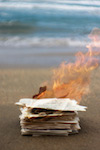 Don’t be surprised if you’re making bad art. Don’t be discouraged. And whatever you do, don’t stop. Keep making bad art. Not because you’re wrong about your self-evaluation — you might be producing some really awful stuff. But just because the thing you’re working on is a ripe mess doesn’t necessarily mean it’s time to stop working. On the contrary, that might be both the worst time and reason to quit. I think you need to make bad art in order to make anything better. I know that’s been the case for me.
Don’t be surprised if you’re making bad art. Don’t be discouraged. And whatever you do, don’t stop. Keep making bad art. Not because you’re wrong about your self-evaluation — you might be producing some really awful stuff. But just because the thing you’re working on is a ripe mess doesn’t necessarily mean it’s time to stop working. On the contrary, that might be both the worst time and reason to quit. I think you need to make bad art in order to make anything better. I know that’s been the case for me.
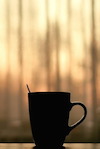 I am momentarily weightless standing here in the waning night, loose from sleep and freed by unfettered rest. Is it even right to be taking my emotional temperature this early in the morning? Shouldn’t I be telling myself how I feel? Brand new day! Clean slate! Expect to see God’s goodness! His mercies are new every morning! I do believe this. But some days it’s hard for the message to sink into my gut. I need extra time to dress myself in that truth.
I am momentarily weightless standing here in the waning night, loose from sleep and freed by unfettered rest. Is it even right to be taking my emotional temperature this early in the morning? Shouldn’t I be telling myself how I feel? Brand new day! Clean slate! Expect to see God’s goodness! His mercies are new every morning! I do believe this. But some days it’s hard for the message to sink into my gut. I need extra time to dress myself in that truth.
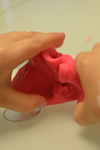 As much as motherhood has taken away — time to write, the ability to practice the piano without little hands taking over the keyboard ("Scooch, Mama”), the mental acuity to use polysyllabic words (or, some days, to finish sentences) — it has given me more. I have not lost myself in motherhood, as I had feared, but discovered myself. I don't just mean I've realized the beauty and joy of being a mother, but in and through motherhood I've grasped new ways of being creative. I learn creativity from my children, who are infinitely the same as and different from me; I learn creativity through my desire to create for them; I learn creativity simply by opening myself up to being something else.
As much as motherhood has taken away — time to write, the ability to practice the piano without little hands taking over the keyboard ("Scooch, Mama”), the mental acuity to use polysyllabic words (or, some days, to finish sentences) — it has given me more. I have not lost myself in motherhood, as I had feared, but discovered myself. I don't just mean I've realized the beauty and joy of being a mother, but in and through motherhood I've grasped new ways of being creative. I learn creativity from my children, who are infinitely the same as and different from me; I learn creativity through my desire to create for them; I learn creativity simply by opening myself up to being something else.
 For me, the empty pages tell the story of my life becoming occupied with things I never suspected would lead me from the corner booth at the coffee shop into the consuming risk and mess and joy and inertia of marrying a woman who beckons me out of isolation, of raising four beautiful and uniquely complex children, of moving from one city to another, of living in a community, and of following a vocation which, ironically, involves more writing than ever.
For me, the empty pages tell the story of my life becoming occupied with things I never suspected would lead me from the corner booth at the coffee shop into the consuming risk and mess and joy and inertia of marrying a woman who beckons me out of isolation, of raising four beautiful and uniquely complex children, of moving from one city to another, of living in a community, and of following a vocation which, ironically, involves more writing than ever.
 yet we have in our soil
yet we have in our soil
an inexhaustible mine
of true wealth,
the foundation of a nation’s
greatness,
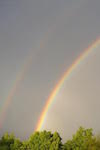 It was a few weeks into the class that I suddenly felt as though I was in the ocean, treading water with seasoned and well-equipped scuba divers. The language was the water surrounding me, warm and inviting, salty and buoyant but dark below. It was the darkness that drew me. As much as I tried to get in touch with the text, with the loss of Eden, I felt drawn to the darkness below and I swam in that.
It was a few weeks into the class that I suddenly felt as though I was in the ocean, treading water with seasoned and well-equipped scuba divers. The language was the water surrounding me, warm and inviting, salty and buoyant but dark below. It was the darkness that drew me. As much as I tried to get in touch with the text, with the loss of Eden, I felt drawn to the darkness below and I swam in that.
 It was in rereading the poems, though, that the poetry got left behind. I started reading these poems as prayers. And not prayers of the animals, but prayers for myself. These are prayers I would never know how to say, for the creature-like movements inside of me are intrinsically inarticulate. These poems are prayers for the animals inside of us — the heavy, slow, frightful, instinctive — those parts of us that fly and plod and bury down.
It was in rereading the poems, though, that the poetry got left behind. I started reading these poems as prayers. And not prayers of the animals, but prayers for myself. These are prayers I would never know how to say, for the creature-like movements inside of me are intrinsically inarticulate. These poems are prayers for the animals inside of us — the heavy, slow, frightful, instinctive — those parts of us that fly and plod and bury down.
 My experience has been that I mistake seasons of “creative dryness” for a season in which it is time to make something else. So, rather than simply waiting for the next moment of inspiration or the next deadline to move you into creative work, move yourself out of your normal discipline and do some painting, drawing, shooting, playing, etc. After all, you are a creature who creates — that is the core of who you are. What you make is secondary.
My experience has been that I mistake seasons of “creative dryness” for a season in which it is time to make something else. So, rather than simply waiting for the next moment of inspiration or the next deadline to move you into creative work, move yourself out of your normal discipline and do some painting, drawing, shooting, playing, etc. After all, you are a creature who creates — that is the core of who you are. What you make is secondary.
 Before, I’d wanted to be a fireman
Before, I’d wanted to be a fireman
and then an electrician
who climbed poles in snowstorms
and, for a spell, an architect.
But I knew the next morning
that it would be something else.
 Pulling a notepad out of your pocket
Pulling a notepad out of your pocket
bent with sitting, grimy and dog-eared
your pencil at the ready, you tumbled
like a bear out of the cab, writing as you ran
Toward the lamb just being born
toward the godly miracle of it, toward the sun















